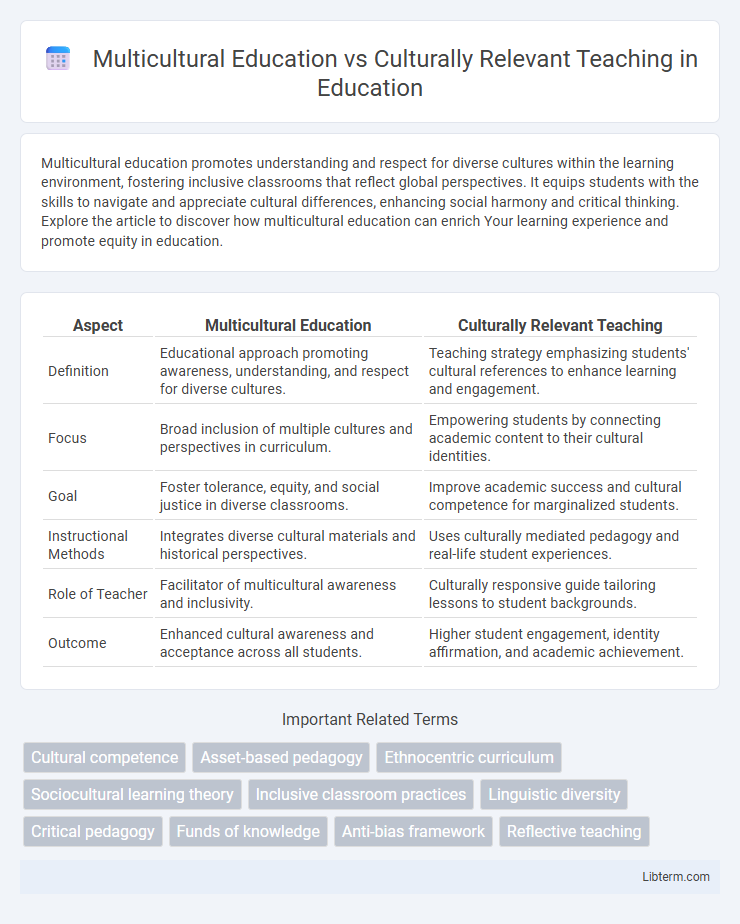Multicultural education promotes understanding and respect for diverse cultures within the learning environment, fostering inclusive classrooms that reflect global perspectives. It equips students with the skills to navigate and appreciate cultural differences, enhancing social harmony and critical thinking. Explore the article to discover how multicultural education can enrich Your learning experience and promote equity in education.
Table of Comparison
| Aspect | Multicultural Education | Culturally Relevant Teaching |
|---|---|---|
| Definition | Educational approach promoting awareness, understanding, and respect for diverse cultures. | Teaching strategy emphasizing students' cultural references to enhance learning and engagement. |
| Focus | Broad inclusion of multiple cultures and perspectives in curriculum. | Empowering students by connecting academic content to their cultural identities. |
| Goal | Foster tolerance, equity, and social justice in diverse classrooms. | Improve academic success and cultural competence for marginalized students. |
| Instructional Methods | Integrates diverse cultural materials and historical perspectives. | Uses culturally mediated pedagogy and real-life student experiences. |
| Role of Teacher | Facilitator of multicultural awareness and inclusivity. | Culturally responsive guide tailoring lessons to student backgrounds. |
| Outcome | Enhanced cultural awareness and acceptance across all students. | Higher student engagement, identity affirmation, and academic achievement. |
Understanding Multicultural Education
Multicultural Education emphasizes transforming the curriculum and school environment to reflect diverse cultural perspectives, promoting equity and social justice in education. This approach aims to prepare students to navigate and appreciate a pluralistic society by integrating multiple cultural narratives and histories. Understanding Multicultural Education involves recognizing systemic inequalities and fostering an inclusive learning atmosphere that values all cultural backgrounds.
Defining Culturally Relevant Teaching
Culturally Relevant Teaching is an educational approach that integrates students' cultural backgrounds into the curriculum to make learning more meaningful and effective. It emphasizes three key components: academic success, cultural competence, and critical consciousness, enabling students to navigate and challenge social inequalities. Unlike general Multicultural Education, which primarily raises awareness about diversity, Culturally Relevant Teaching actively connects content to students' lived experiences and fosters empowerment.
Historical Roots and Development
Multicultural education emerged in the 1960s as a response to the civil rights movement, emphasizing the inclusion of diverse cultural perspectives in the curriculum to promote equity and social justice. Culturally relevant teaching, formulated by Gloria Ladson-Billings in the 1990s, builds on multicultural education by focusing specifically on students' cultural identities to foster academic success, cultural competence, and critical consciousness. Both frameworks share roots in combating educational inequality but differ in approach, with multicultural education aimed at systemic curriculum reform and culturally relevant teaching centered on pedagogical practices tailored to students' lived experiences.
Key Philosophical Differences
Multicultural education promotes understanding and appreciation of diverse cultures through inclusive curricula that represent multiple cultural perspectives. Culturally relevant teaching emphasizes connecting academic content to students' cultural backgrounds to enhance engagement and identity affirmation. The key philosophical difference lies in multicultural education's broader focus on cultural awareness, whereas culturally relevant teaching centers on empowering students by validating and incorporating their lived experiences into learning.
Goals and Objectives Compared
Multicultural education aims to foster respect and understanding among diverse student populations by promoting knowledge of multiple cultures and reducing prejudice. Culturally relevant teaching focuses on connecting curriculum content to students' cultural backgrounds to enhance engagement, academic achievement, and identity development. While multicultural education emphasizes inclusivity and diversity awareness, culturally relevant teaching prioritizes academic success through culturally responsive pedagogy tailored to students' lived experiences.
Curriculum Design and Content
Multicultural education embraces curriculum design that integrates diverse cultural perspectives broadly to promote inclusivity and awareness among all students. Culturally relevant teaching focuses on curriculum content that directly reflects and validates the lived experiences, values, and cultural backgrounds of specific student groups to enhance engagement and academic success. Both approaches prioritize representation but differ in scope, with multicultural education aiming for broad inclusivity and culturally relevant teaching emphasizing cultural responsiveness tailored to the students' identities.
Teacher Roles and Responsibilities
Teachers in multicultural education act as facilitators who create inclusive environments by recognizing diverse cultural backgrounds and promoting equal access to learning resources. In culturally relevant teaching, educators take on the role of cultural mediators, integrating students' cultural experiences into the curriculum to enhance engagement and academic success. Both approaches require teachers to continuously adapt instructional strategies, develop cultural competence, and foster critical thinking about social justice issues.
Student Engagement and Outcomes
Multicultural education promotes awareness and respect for diverse cultures, enhancing student engagement by validating multiple perspectives in the classroom. Culturally relevant teaching goes further by integrating students' cultural backgrounds directly into the curriculum, which improves academic outcomes and fosters a deeper connection to the material. Research shows culturally relevant pedagogy increases motivation, critical thinking, and achievement among students from marginalized communities.
Challenges and Criticisms
Multicultural Education faces challenges such as superficial inclusion of diverse cultures and promoting tokenism without addressing systemic inequalities. Culturally Relevant Teaching is criticized for potentially reinforcing cultural stereotypes and being difficult to implement consistently across diverse classrooms. Both approaches struggle with balancing cultural representation and academic standards while navigating institutional constraints.
Best Practices and Implementation Strategies
Multicultural education emphasizes incorporating diverse cultural perspectives into the curriculum to promote inclusivity and respect, while culturally relevant teaching adapts instructional methods to students' cultural contexts to enhance engagement and academic success. Best practices include developing culturally responsive lesson plans, fostering inclusive classroom environments, and providing professional development for educators on cultural competence. Implementation strategies focus on ongoing reflection, collaboration with community members, and integrating students' cultural identities into learning experiences to improve educational outcomes.
Multicultural Education Infographic

 libterm.com
libterm.com